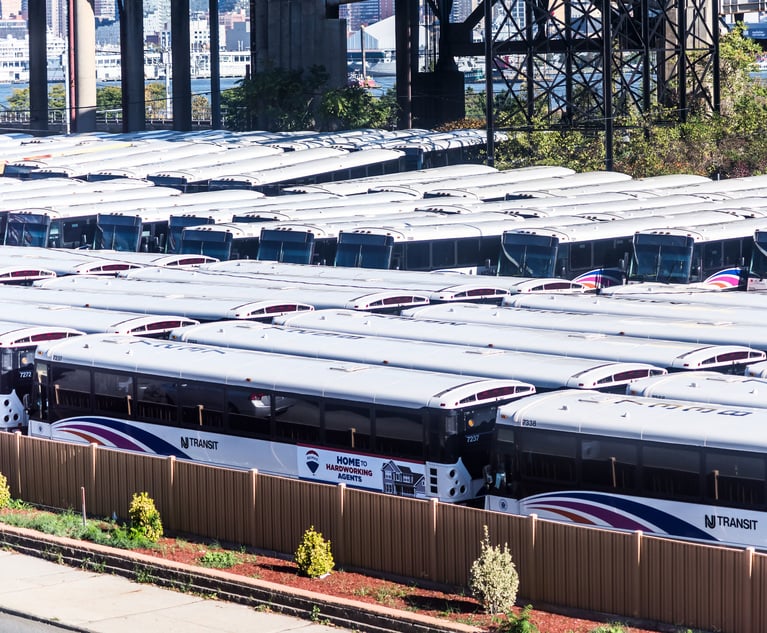NJ Residents Deserve Justice On Tax Incentives Issue
We await the outcome of the tension between the legal and investigatory processes currently in play in connection with the Economic Development Authority. We look forward to a resolution based on both the law and justice. Camden, and other state residents, deserve no less.
October 13, 2019 at 10:00 AM
7 minute read

$362 million in tax revenue is a lot of money by any measure.
But to a resident of the tax revenue-starved city of Camden—the poorest city in New Jersey, ravaged by crime and drug trafficking, where the per capita income is just over $13,600, abandoned housing is ubiquitous, most roads resemble potholed washboards, and educational under-achievement is rampant—that money is a measure of the contrasting quality of life enjoyed in the proximate suburbs. A recent decision in Norcross v. Murphy has laid bare serious problems in the award and administration of tax incentives relative to Camden.
Some background. In 1974, the New Jersey Economic Development Authority (EDA) was created by statute. In 2012, the EDA was legislatively authorized to administer the Grow New Jersey Assistance Act (Grow NJ), which offered tax incentives for new job creation or existing job retention which, without tax incentives, would be eliminated or relocated outside New Jersey. The Grow NJ tax incentives amounted to some $11 billion statewide.
In January 2017, under the Christie administration, the State Auditor issued a report that identified, among other things, inadequate verification procedures used by EDA as to what companies were grant-eligible and whether the jobs, intended to be retained, actually were. Specifically, that report noted tax-incentive projects in Camden having inadequate documentation that needed further examination because they might not be in the best interests of the state.
In January 2018, Gov. Murphy directed the State Comptroller to conduct a comprehensive performance audit of the EDA's tax incentive programs, including Grow NJ, from 2010 to date, in order to "inform the public about the EDA's operations" and to "assist lawmakers in their deliberations as to whether these programs should be reauthorized when they expire on July 1, 2019."
On Jan. 9, 2019, the State Comptroller issued a report, which found that, among other things, the EDA had failed to comply with the applicable statutes and regulations and to implement key internal controls for monitoring the performance of tax-incentive beneficiaries, indicating significant deficiencies in EDA's management and oversight of the tax incentives programs.
On Jan. 19, 2019, by Executive Order 52, Gov. Murphy created the Governor's Task Force on EDA Tax Incentives (TF). The TF was delegated gubernatorial investigative powers pursuant to N.J.S.A. 52:15-7, including subpoena power. In fulfilling its mandate of examining the "design, implementation, and oversight" of EDA's tax incentive programs, the TF focused on both the legislative design of the programs, including the influence of special interests, and EDA's administration of the programs. Toward that end, the TF (1) reviewed thousands of pages of both public and non-public documents from EDA, other agencies, tax-incentive beneficiary companies, and others, (2) interviewed scores of witnesses, including current and former EDA staff, other government employees, other persons with relevant knowledge, and several policy experts, and (3) held public hearings.
On May 21, 2019, suit was filed in Superior Court, Mercer County, by four plaintiffs: George E. Norcross; Connor Strong & Buckelew LLC (chaired by George E. Norcross); NFI L.P.; The Michaels Organization LLC; Cooper University Health Care (chaired by George E. Norcross); and the law firm of Parker McCay P.A. (chaired by Philip Norcross, Esq., brother of George E. Norcross). In a five-count complaint naming the governor, the head of the TF and its lawyers, and the EDA, plaintiffs challenged the validity of the TF and asserted violations of their constitutional and statutory rights. They sought declaratory relief that N.J.S.A. 52:15-7 did not authorize the governor to investigate the EDA, much less plaintiffs as private parties, who in any event should have the right to confront their accusers and present evidence. They also alleged that the TF's lawyers are being improperly paid with unappropriated taxpayer dollars and are not authorized to practice law in New Jersey. By order to show cause plaintiffs petitioned for a temporary injunction to stop the TF's investigation, including publication of the TF's Preliminary Report.
On June 17, 2019, Assignment Judge Mary C. Jacobson denied a temporary injunction and the TF's Preliminary Report (Report) was published that day. The Report's two major findings were (1) that "[s]pecial interests…had a significant impact on the design of the Grow NJ statutes and regulations," and (2) "[t]he EDA did not have adequate procedures in place to ensure that it discovered relevant information, including applicant misstatements, that would have led to rejection of some applications or a significant reduction in the amount of certain awards."
As to the first finding, the TF found that "special interests—in the form of a law and lobbying firm [Parker McCay] and the clients on whose behalf it apparently represented—appear to have had a significant impact on the Grow NJ statute … and its implementing regulations." Contrary to the "straightforward formula" of new jobs created or existing jobs retained because of the tax incentive award, Parker McCay proposed an amended provision to offer an "alternative approach to award calculation exclusively for incentivized projects in Camden … [which is] effectively decoupled from the number of jobs created or retained by the company, and is instead tied to … the size of the company's capital investment in the project." According to a report of the Rutgers Bloustein School, this resulted in the average tax incentive cost of $55,888 per job incentivized contrasted with the Camden alternative approach of $340,000—"over six times more."
As to the second finding regarding adequate procedures, the TF found that the EDA had a "fundamental lack of [administrative] controls [that] led to important misunderstandings over threshold requirements for applications and inconsistency within the EDA in its evaluation and application of Program requirements—including confusion over even the basic level of scrutiny to be applied to applicants." The TF offered nine preliminary recommendations for legislative improvement.
On July 31, 2019, in a comprehensive and soundly reasoned opinion, the court granted defendants' intervening motion to dismiss, for essentially the same reasons as the denial of the temporary injunction. First, the court found that the governor had statutory authority to investigate the EDA, based on a commonsense interpretation of the statute. Contrary to the charge that the TF investigation was not a bona fide examination, the court noted the objective fact that the TF was legitimately initiated only after two independent findings of significant problems with the EDA. Second, the focus of the TF was not the private parties, but the level of diligence applied by EDA to vetting the applications of those private parties, particularly about jobs moving out of New Jersey, an issue of significant public interest. Third, since the TF was a fact-finding investigative body, without accusatory or adjudicative functions, due process did not require trial-like protections. In this regard, the court observed that the private parties voluntarily declined to participate in the public hearings and did not respond to the TF's subpoenas. The final two counts were summarily treated.
Much has happened since then. Plaintiffs appealed from the order of dismissal. The governor issued a lengthy conditional veto of Senate Bill No. 3901 that would have extended the billion-dollar corporate tax incentive programs and instead recommended $400 million in innovation-driven efforts with oversight that the embattled system "desperately lacked." The TF's investigation is ongoing.
It is not lost on us that, not the EDA, but only a select few private companies are challenging what the court has deemed a lawful investigation of EDA operations. We await the outcome of the tension between the legal and investigatory processes currently in play, we are very mindful of the political forces at work behind the scenes, and we are well aware of the powerlessness of the impoverished residents of the city of Camden in these circumstances.
We look forward to a resolution based on both the law and justice. Camden, and other state residents, deserve no less.
Editorial Board members Ronald Chen, Barry Evenchick, Joseph Hayden, Lawrence Lustberg, Michael Stein, Edwin Stern and Justin Walder recused from this editorial.
This content has been archived. It is available through our partners, LexisNexis® and Bloomberg Law.
To view this content, please continue to their sites.
Not a Lexis Subscriber?
Subscribe Now
Not a Bloomberg Law Subscriber?
Subscribe Now
NOT FOR REPRINT
© 2025 ALM Global, LLC, All Rights Reserved. Request academic re-use from www.copyright.com. All other uses, submit a request to [email protected]. For more information visit Asset & Logo Licensing.
You Might Like
View All

Judge Jablonski and Chief Justice Rabner Both Acted Completely Properly
4 minute read
In 2-1 Ruling, Court Clears Way for Decade-Old Wrongful Imprisonment Suit
5 minute read
Trending Stories
Who Got The Work
Michael G. Bongiorno, Andrew Scott Dulberg and Elizabeth E. Driscoll from Wilmer Cutler Pickering Hale and Dorr have stepped in to represent Symbotic Inc., an A.I.-enabled technology platform that focuses on increasing supply chain efficiency, and other defendants in a pending shareholder derivative lawsuit. The case, filed Oct. 2 in Massachusetts District Court by the Brown Law Firm on behalf of Stephen Austen, accuses certain officers and directors of misleading investors in regard to Symbotic's potential for margin growth by failing to disclose that the company was not equipped to timely deploy its systems or manage expenses through project delays. The case, assigned to U.S. District Judge Nathaniel M. Gorton, is 1:24-cv-12522, Austen v. Cohen et al.
Who Got The Work
Edmund Polubinski and Marie Killmond of Davis Polk & Wardwell have entered appearances for data platform software development company MongoDB and other defendants in a pending shareholder derivative lawsuit. The action, filed Oct. 7 in New York Southern District Court by the Brown Law Firm, accuses the company's directors and/or officers of falsely expressing confidence in the company’s restructuring of its sales incentive plan and downplaying the severity of decreases in its upfront commitments. The case is 1:24-cv-07594, Roy v. Ittycheria et al.
Who Got The Work
Amy O. Bruchs and Kurt F. Ellison of Michael Best & Friedrich have entered appearances for Epic Systems Corp. in a pending employment discrimination lawsuit. The suit was filed Sept. 7 in Wisconsin Western District Court by Levine Eisberner LLC and Siri & Glimstad on behalf of a project manager who claims that he was wrongfully terminated after applying for a religious exemption to the defendant's COVID-19 vaccine mandate. The case, assigned to U.S. Magistrate Judge Anita Marie Boor, is 3:24-cv-00630, Secker, Nathan v. Epic Systems Corporation.
Who Got The Work
David X. Sullivan, Thomas J. Finn and Gregory A. Hall from McCarter & English have entered appearances for Sunrun Installation Services in a pending civil rights lawsuit. The complaint was filed Sept. 4 in Connecticut District Court by attorney Robert M. Berke on behalf of former employee George Edward Steins, who was arrested and charged with employing an unregistered home improvement salesperson. The complaint alleges that had Sunrun informed the Connecticut Department of Consumer Protection that the plaintiff's employment had ended in 2017 and that he no longer held Sunrun's home improvement contractor license, he would not have been hit with charges, which were dismissed in May 2024. The case, assigned to U.S. District Judge Jeffrey A. Meyer, is 3:24-cv-01423, Steins v. Sunrun, Inc. et al.
Who Got The Work
Greenberg Traurig shareholder Joshua L. Raskin has entered an appearance for boohoo.com UK Ltd. in a pending patent infringement lawsuit. The suit, filed Sept. 3 in Texas Eastern District Court by Rozier Hardt McDonough on behalf of Alto Dynamics, asserts five patents related to an online shopping platform. The case, assigned to U.S. District Judge Rodney Gilstrap, is 2:24-cv-00719, Alto Dynamics, LLC v. boohoo.com UK Limited.
Featured Firms
Law Offices of Gary Martin Hays & Associates, P.C.
(470) 294-1674
Law Offices of Mark E. Salomone
(857) 444-6468
Smith & Hassler
(713) 739-1250






